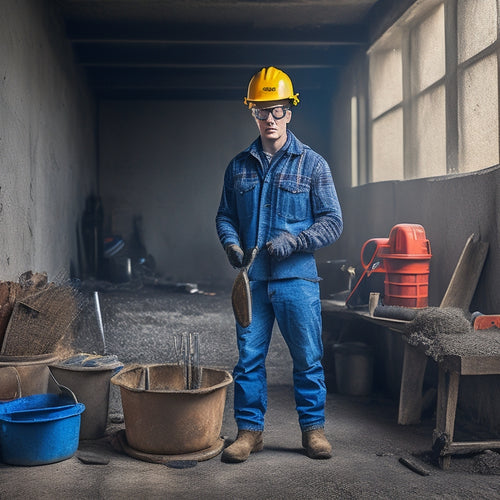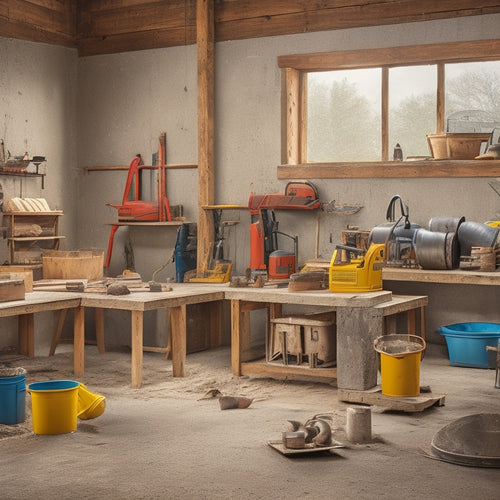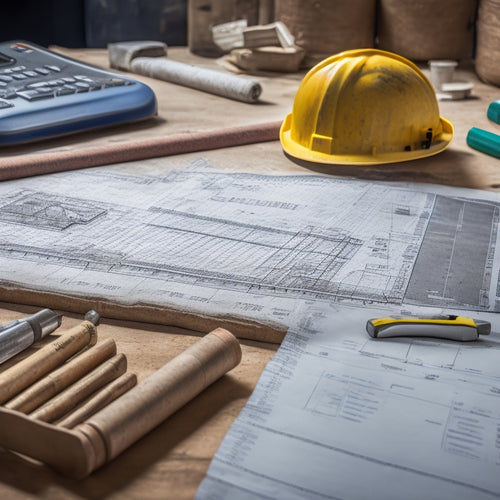
Top Tools for a Successful Concrete Floor Remodel
Share
You'll need a range of specialized tools to achieve a successful concrete floor remodel. Start with essential grinders for concrete preparation, selecting the right grit and power source for your project. Floor scrapers are necessary for efficient adhesive removal, while concrete edgers guarantee precise cuts along walls and curves. For a high-shine finish, utilize polishing machines with gradual grit progression. Don't forget densifiers to harden the concrete, compaction tools for a flat floor, and moisture testing equipment to detect surface moisture. With these must-haves, you'll be well on your way to a durable and polished finish - now, explore each tool in more detail to master your remodel.
Key Takeaways
• Essential tools for concrete preparation include grinders, floor scrapers, and compaction tools to ensure a smooth and even surface.
• Precision and finishing tools like concrete edgers, polishing machines, and sealant application tools help achieve a high-quality finish.
• Densifiers and proper application methods enhance concrete durability, increasing strength, abrasion resistance, and stain resistance.
• Crack repair tools and materials, along with safety gear and training, are crucial for a successful and safe concrete floor remodel.
• Moisture management, including moisture testing equipment and barriers, helps prevent issues and ensures a long-lasting finish.
Essential Grinders for Concrete Prep
Selecting the right grinder for concrete preparation is essential, as it sets the stage for a successful floor remodel by efficiently removing old coatings, adhesive residue, and uneven surfaces.
You'll want to take into account the specific grinder types and their capabilities to tackle your concrete floor. There are walk-behind grinders, ideal for large areas, and handheld grinders, perfect for smaller spaces and detailed work.
Additionally, you'll need to choose the right grit selection for your grinder. A coarse grit (16-20) is best for aggressive material removal, while a finer grit (30-40) is better suited for smoothing and polishing.
When selecting a grinder, contemplate the power source, as electric and propane options are available. Electric grinders are ideal for indoor projects, while propane grinders offer more flexibility for outdoor use.
You'll also want to think about the weight and maneuverability of the grinder, as well as the dust collection system to guarantee a safe and efficient working environment.
Floor Scrapers for Old Adhesive
Removing old adhesive residue from your concrete floor requires a reliable floor scraper, a tool specifically designed to tackle this essential step in the remodeling process.
You'll need a scraper that can effectively remove old adhesive without damaging the underlying concrete. When it comes to adhesive removal techniques, a good floor scraper can make all the difference.
Here are three key benefits to evaluate when choosing a floor scraper for old adhesive:
-
Efficient Adhesive Removal: Look for a scraper with a durable blade that can effectively remove old adhesive without leaving behind residue or damaging the concrete.
-
Ergonomic Design: A comfortable, ergonomic design will reduce fatigue and make the removal process less strenuous.
-
Adjustable Handle: An adjustable handle will allow you to customize the scraper to your preferred working height, reducing strain and improving control.
Concrete Edgers for Precise Cuts
You'll need a concrete edger that can make precise cuts along walls, around obstructions, and along curved edges to achieve a professional-looking finish in your concrete floor remodel. A high-quality concrete edger is essential for creating clean, defined edges that set the tone for the entire project.
When selecting a concrete edger, look for precision cutting tools that can handle various concrete edging techniques. Consider an edger with adjustable blades and guides to accommodate different angles and curves. This will allow you to make precise cuts with ease, ensuring a seamless shift between the concrete floor and surrounding surfaces.
Invest in a concrete edger that features a robust motor and durable construction to withstand the demands of heavy use. A well-built edger will provide consistent results, reducing the risk of errors and rework.
With the right concrete edger, you'll be able to achieve precise cuts and edges that elevate the overall aesthetic of your concrete floor remodel. By incorporating advanced concrete edging techniques and precision cutting tools into your workflow, you'll be able to deliver high-quality results that exceed your clients' expectations.
Polishing Machines for High Shine
With precise edges achieved, it's time to turn your attention to polishing machines that can deliver a high-shine finish, elevating your concrete floor remodel from ordinary to extraordinary.
These machines are designed to bring out the full potential of your concrete floor, and with the right techniques, you can achieve a finish that's both durable and aesthetically pleasing.
To get the best results, you'll need to master various polishing techniques, including honing, grinding, and polishing.
Here are three essential considerations to keep in mind:
-
Surface preparation: Verify the floor is clean, dry, and free of any contaminants that could affect the polishing process.
-
Polishing machine selection: Choose a machine that's suitable for your floor size, type, and desired finish.
-
Grit progression: Gradually move from coarse to fine grits to achieve a high-shine finish.
Densifiers for Hardening Concrete
When you're looking to take your concrete floor to the next level, you'll want to explore the benefits of densifiers for hardening concrete.
By applying these specialized products, you'll be able to greatly boost the strength of your concrete, making it more resistant to wear and tear.
In the following sections, we'll break down the key points of densifiers, including their ability to enhance concrete strength, the various application methods, and how they improve surface durability.
Concrete Strength Boost
By applying densifiers to your concrete floor, it will absorb and react with the calcium hydroxide in the concrete, producing a stronger, more durable surface. This process is an essential step in achieving a high-performance concrete floor.
As you explore the benefits of concrete additives, you'll discover that densifiers offer a range of advantages that can elevate your remodel.
Here are just a few ways densifiers can boost your concrete floor's strength:
-
Increased durability: Densifiers help to fill in pores and voids, making your concrete more resistant to wear and tear.
-
Improved abrasion resistance: By hardening the surface, densifiers reduce the risk of scratches and damage from heavy foot traffic or equipment.
-
Enhanced stain resistance: A densified surface is more impermeable, making it easier to clean and maintain.
Densifier Application Methods
You'll need to choose the most effective densifier application method for your concrete floor, as it directly impacts the hardening process and ultimate durability of the surface. The right application technique can make all the difference in achieving a strong, long-lasting finish.
There are several densifier types to take into account, each with its own strengths and weaknesses. For example, lithium-based densifiers are known for their fast absorption rate and are ideal for high-traffic areas. Sodium-based densifiers, on the other hand, are more cost-effective and suitable for general-purpose applications.
When it comes to application techniques, you'll need to decide between spraying, rolling, or brushing the densifier onto the concrete surface. Spraying is often the most efficient method, especially for large areas, while rolling or brushing may be more suitable for smaller areas or those with complex geometries.
Regardless of the method you choose, it's crucial to follow the manufacturer's instructions and guarantee the densifier is applied evenly and consistently. By selecting the right densifier type and application technique, you'll be able to achieve a strong, durable, and long-lasting concrete floor that meets your project's requirements.
Improved Surface Durability
Improved Surface Durability
Densifiers play a critical role in hardening concrete, as they greatly improve the surface durability by reacting with the calcium hydroxide in the concrete to form a stronger, more impermeable crystal structure. This process not only enhances the concrete's resistance to wear and tear but also reduces the risk of damage from spills, stains, and other forms of contamination.
When you apply a densifier, you can expect:
-
Enhanced stain resistance: Your concrete floor will be better equipped to withstand spills and stains, making cleanup a breeze.
-
Increased abrasion resistance: Your floor will be more resistant to scratches and wear, maintaining its appearance for longer.
-
Reduced maintenance needs: With a densified surface, you'll spend less time and money on maintenance and repairs.
Sealant Application Tools Needed
To guarantee a successful sealant application, gather the necessary tools, including a high-quality lambswool applicator, a foam brush, or a microfiber roller, depending on the type of sealant and surface finish desired.
These tools will help you achieve a uniform coat and avoid unevenness, ensuring a professional-looking finish. When choosing a sealant application tool, consider the type of sealant you're using and the surface finish you want to achieve. For example, lambswool applicators are ideal for solvent-based sealants, while foam brushes work well with water-based sealants. Microfiber rollers are versatile and can be used with both types.
When selecting the best sealant products for your project, consider factors such as durability, stain resistance, and UV stability. Look for products that are specifically designed for concrete floors and follow the manufacturer's instructions for application and drying times.
By mastering sealant application techniques and using the right tools and products, you'll be able to achieve a high-gloss finish that enhances the beauty of your concrete floor.
With the right tools and techniques, you'll be able to transform your concrete floor into a durable, low-maintenance surface that withstands heavy foot traffic and harsh environmental conditions.
Compaction Tools for Flat Floors
Achieving a flat, even surface requires the right compaction tools, which can make all the difference in preventing uneven settlement, cracks, and other imperfections that can compromise the integrity of your concrete floor.
You'll want to invest in effective machinery that can handle various compaction techniques to guarantee a smooth finish.
Here are three essential compaction tools you'll need:
-
Plate Compactors: These machines use a flat plate to compress the concrete, providing a high level of compaction force. They're ideal for large, open areas and can be powered by electric, gasoline, or diesel engines.
-
Roller Compactors: These tools use a rolling drum to compress the concrete and are often used in conjunction with plate compactors. They're particularly effective for compacting larger areas and can be used for both new construction and renovation projects.
-
Hand Tamper: A hand tamper is a manual tool used for compacting small areas, such as edges and corners. It's essential for achieving a smooth finish in tight spaces.
Moisture Testing Equipment Required
When you're preparing to remodel a concrete floor, it's essential that you test for moisture to avoid costly issues down the line.
You'll need to invest in moisture testing equipment that can provide accurate readings, and you should focus on two key areas: relative humidity readings and surface moisture detection.
Relative Humidity Readings
You'll need a hygrometer to take accurate relative humidity readings, which involve measuring the air's moisture content near the concrete floor. This is vital in guaranteeing the success of your concrete floor remodel, as high humidity levels can lead to issues with flooring installations and finishes.
Here are three key reasons why relative humidity readings are essential:
-
Humidity control: Measuring relative humidity helps you identify areas where moisture is accumulating, allowing you to implement effective humidity control measures to prevent issues like mold growth and flooring damage.
-
Moisture barriers: Accurate relative humidity readings enable you to determine the most effective moisture barrier systems to install, making certain that your flooring is protected from moisture-related damage.
-
Ideal flooring performance: By controlling humidity levels, you can guarantee that your flooring materials perform ideally, reducing the risk of warping, buckling, or other damage.
Surface Moisture Detection
To detect surface moisture, which can compromise your concrete floor remodel, it's vital to employ specialized moisture testing equipment that can accurately identify the presence of excess moisture on the surface.
You'll need to invest in reliable tools that can provide precise readings, guaranteeing your newly installed moisture barriers are effective.
When selecting a moisture testing device, consider the testing techniques you'll employ. Some popular methods include calcium chloride testing, which measures the moisture vapor emission rate, and relative humidity testing, which assesses the humidity levels within the concrete slab.
You may also opt for non-destructive testing methods, such as infrared thermography or electrical impedance, which can detect moisture without damaging the surface.
Regardless of the testing technique you choose, it's important to follow the manufacturer's instructions and take multiple readings to verify accurate results.
By doing so, you'll be able to identify areas with high moisture levels and take corrective action before proceeding with your concrete floor remodel.
This proactive approach will save you time, money, and potential headaches down the line.
Crack Repair Tools and Materials
Effective crack repair relies on selecting the right combination of tools and materials that can withstand the stresses and movements of the concrete floor.
You'll need to choose products that can bond well with the concrete, resist shrinkage, and accommodate floor movement.
When it comes to crack repair, you'll want to have the following essential tools and materials in your arsenal:
-
Epoxy injection kits: For filling and bonding cracks, these kits provide a strong, long-lasting solution.
-
Crack sealing compounds: Flexible and durable, these compounds are perfect for sealing cracks and joints.
-
Surface preparation tools: From grinding and scarifying to shot blasting, these tools help guarantee a strong bond between the repair material and the concrete floor.
Safety Gear for Flooring Pros
As a flooring pro, wearing the right safety gear is vital to preventing injuries and safeguarding a successful concrete floor remodel. You can't afford to compromise on safety, especially when working with heavy machinery and hazardous materials.
Your protective equipment should include hard hats, safety glasses, earplugs, dust masks, and steel-toed boots. Don't forget gloves with grip to prevent slipping and falling. Additionally, invest in knee pads and elbow protection for those long hours of kneeling and crawling.
Beyond the gear, it's important to undergo thorough safety training. This should cover topics like fall protection, electrical safety, and hazardous materials handling. You should also be familiar with OSHA regulations and industry best practices.
Stay up-to-date with the latest safety protocols and guidelines to maintain a secure working environment. Remember, safety is everyone's responsibility on the job site. By prioritizing safety gear and training, you'll be better equipped to tackle complex concrete floor remodels with confidence and precision.
Frequently Asked Questions
Can I Remodel a Concrete Floor With Existing Cracks and Damage?
You can remodel a concrete floor with existing cracks and damage, but first, you'll need to conduct a thorough damage assessment to identify the severity of the cracks, and then apply effective crack repair techniques to guarantee a stable foundation for your remodel.
How Long Does a Concrete Floor Remodel Typically Take to Complete?
You're likely wondering how long your concrete floor remodel will take to complete. Consider a 1,000 sq. ft. residential project, where a remodeling timeline of 4-6 weeks is typical, depending on project factors like complexity, material delivery, and labor availability.
Are Concrete Floor Remodels Suitable for Residential or Commercial Spaces?
You'll find concrete floor remodels suitable for both residential spaces, offering benefits like durability and low maintenance, and commercial applications, where high-traffic resistance and design versatility are essential.
Do I Need to Hire a Professional for a Concrete Floor Remodel?
"As you ponder the complexities of concrete floor remodeling, remember the wisdom of Michelangelo: 'ancora imparo' (I am still learning). While DIY techniques can be tempting, consider the cost considerations and potential pitfalls, and you'll likely conclude that hiring a professional is the wisest choice."
Can I Change the Color or Design of My Concrete Floor During a Remodel?
You can definitely change the color or design of your concrete floor during a remodel, exploring various color options and design techniques, such as staining, stamping, or overlaying, to achieve a unique, personalized look.
Conclusion
You've got the right tools for a successful concrete floor remodel.
With the right equipment, you can transform a dull, worn-out floor into a stunning, high-gloss surface.
According to the American Concrete Institute, 75% of concrete floors can be restored to their original condition with proper preparation and polishing.
By investing in these top tools, you'll be well on your way to achieving a showroom-quality finish that will last for years to come.
Related Posts
-

What Tools Do I Need for Concrete Wall Repair
As you prepare for a concrete wall repair job, you'll need a variety of tools to guarantee a successful outcome. Star...
-

What Tools to Rent for a Concrete Home Reno
When tackling a concrete home renovation, you'll need to rent a variety of specialized tools to get the job done. For...
-

5 Tips for Accurate Concrete Measurement Tools
To guarantee accurate concrete measurement, you'll want to calibrate your measuring tools regularly, choosing a frequ...


